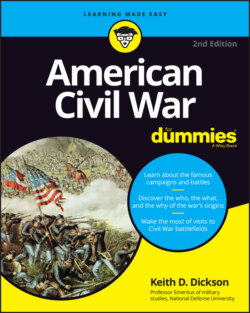Читать книгу American Civil War For Dummies - Keith D. Dickson - Страница 92
Creating a Strategy: Three Basic Questions
ОглавлениеA state or nation must have a strategy to fight a war. Otherwise the war has no direction or purpose. To determine a strategy, leaders must answer three basic questions that form the base of a wartime strategy:
What are you trying to do? In war, an ironclad connection exists between political objectives and the conduct of war. Both President Lincoln and President Davis had to determine their political objectives for the war. For Lincoln and the North, the initial political objective was to end the rebellion of the Southern states and restore the Union. For Davis and the Confederacy, the political objective was to gain and maintain its independence as a sovereign nation. These broad political goals become the means to determining a military strategy. War aims can change, depending on the outcome of campaigns and battles. The Union could not justify the war and its costs on its original objectives; another objective had to be added after 1862, which will be revealed soon,
What do you have (or need)? Answering this question involves an assessment and comparison of both your own and the enemy’s resources. Remember, this means resources in the broadest sense — a nation’s manpower, material stockpiles, finances, industrial capacity, and farm production. You need all of these things to fight and sustain a war. Another critically important national wartime resource is morale. Morale is the national will — how willing are the people (men, women, children) to suffer and endure to achieve victory? It is an intangible, but critical, strategic resource. A nation’s leadership can sustain and nurture morale or squander it. Likewise, a nation can have very little in terms of resources, but with high morale it can overcome limitations and hardships to still win the war. Another important factor is will. How willing is the population to suffer the strains and terrible costs of war to achieve the political goals the leaders have outlined that define victory? You can have all the resources in the world and still lose a war because the people and the leadership do not have the will to employ them because the costs are too high to sustain. In the same way, will can make up for many deficiencies if the people and leadership are willing to commit everything to achieve victory. For both the Union and the Confederacy, national morale and the will to sustain the terrible fight played a significant role in both the conduct and outcome of the war.
How do you use what you have? All of the elements of national power must be employed in the proper proportions and at the right time to assure victory in war. This sounds simple, but it is not! There are many important questions national leaders must ask. Here are a few examples: How are the nation’s strategic objectives (or war aims, as they are sometimes called) accomplished by the use of these elements of power? How do you bring in and orchestrate economic power, moral power, diplomatic power, and military power? Where is one more effective than another? When should a nation employ its power? In what kind of mix? How will these elements of power weaken or negate an enemy’s strength? These were questions that both President Lincoln and President Davis struggled to answer (as have most political leaders throughout history). Although neither leader ever answered these questions sufficiently, Lincoln, of course, in the end addressed them well enough to bring about the final defeat of the Confederacy.
